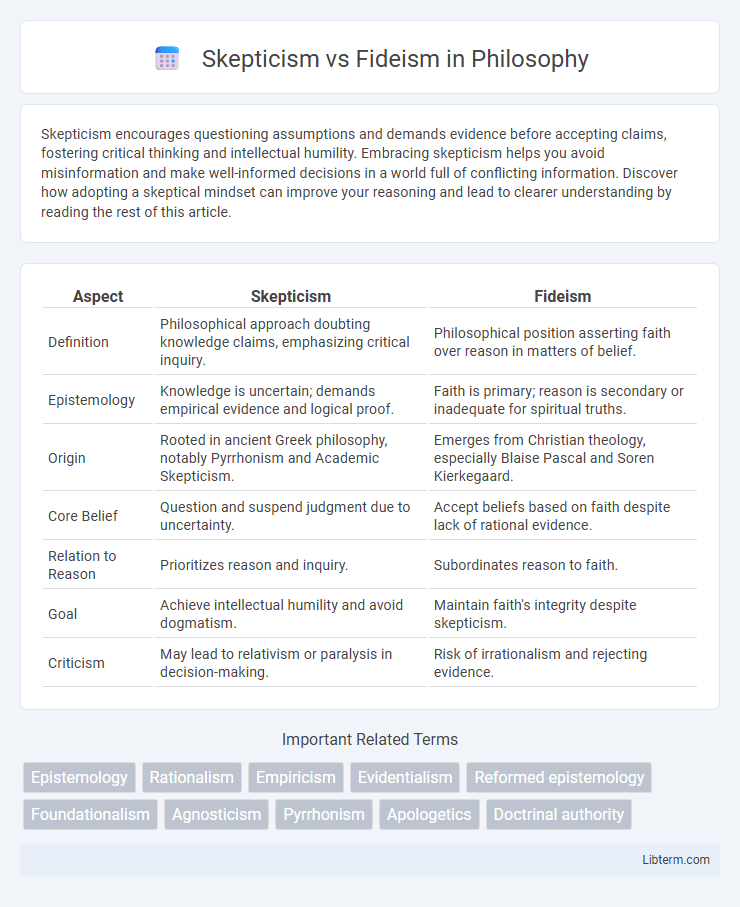Skepticism encourages questioning assumptions and demands evidence before accepting claims, fostering critical thinking and intellectual humility. Embracing skepticism helps you avoid misinformation and make well-informed decisions in a world full of conflicting information. Discover how adopting a skeptical mindset can improve your reasoning and lead to clearer understanding by reading the rest of this article.
Table of Comparison
| Aspect | Skepticism | Fideism |
|---|---|---|
| Definition | Philosophical approach doubting knowledge claims, emphasizing critical inquiry. | Philosophical position asserting faith over reason in matters of belief. |
| Epistemology | Knowledge is uncertain; demands empirical evidence and logical proof. | Faith is primary; reason is secondary or inadequate for spiritual truths. |
| Origin | Rooted in ancient Greek philosophy, notably Pyrrhonism and Academic Skepticism. | Emerges from Christian theology, especially Blaise Pascal and Soren Kierkegaard. |
| Core Belief | Question and suspend judgment due to uncertainty. | Accept beliefs based on faith despite lack of rational evidence. |
| Relation to Reason | Prioritizes reason and inquiry. | Subordinates reason to faith. |
| Goal | Achieve intellectual humility and avoid dogmatism. | Maintain faith's integrity despite skepticism. |
| Criticism | May lead to relativism or paralysis in decision-making. | Risk of irrationalism and rejecting evidence. |
Introduction to Skepticism and Fideism
Skepticism challenges the certainty of knowledge by questioning the reliability of reason and sensory experience, emphasizing doubt and continuous inquiry. Fideism asserts that faith is the primary basis for belief, positing that religious truths often transcend rational proof and must be accepted without empirical evidence. These contrasting epistemological approaches highlight the tension between reason-based understanding and faith-centered conviction.
Historical Origins and Development
Skepticism originated in ancient Greece, notably with Pyrrho of Elis, emphasizing doubt and inquiry as methods to achieve mental tranquility, while fideism emerged in the early Christian era, particularly through figures like Tertullian, advocating faith as superior to reason in accessing religious truths. Throughout the Middle Ages, skepticism evolved through the works of scholastic philosophers such as Sextus Empiricus and later Renaissance thinkers, questioning empirical knowledge limits. Fideism gained prominence during the Reformation, with theologians like Martin Luther emphasizing faith alone (sola fide) as the foundation for salvation, contrasting with rationalist approaches to knowledge.
Core Tenets of Skepticism
Skepticism centers on questioning the possibility of certain knowledge and demands rigorous evidence before accepting beliefs. It emphasizes continuous inquiry, critical thinking, and the suspension of judgment in the absence of sufficient proof, contrasting with fideism's reliance on faith without requiring empirical justification. Core tenets include doubt as a method to avoid error and the belief that claims must be supported through reason and experience.
Fundamental Principles of Fideism
Fideism asserts that faith is the primary path to knowledge, emphasizing belief without reliance on reason or empirical evidence. This principle holds that certain truths, especially religious ones, are accessible only through unwavering faith. Unlike skepticism, which doubts or demands evidence, fideism accepts revelation and spiritual conviction as fundamental sources of truth.
Key Philosophers and Influencers
Skepticism, championed by philosophers like Pyrrho and David Hume, emphasizes doubt and critical inquiry, questioning the possibility of certain knowledge. Fideism, advanced by thinkers such as Blaise Pascal and Soren Kierkegaard, asserts that faith is independent of reason and essential for understanding spiritual truths. The contrast between Hume's empirical skepticism and Kierkegaard's existential fideism highlights the ongoing philosophical debate regarding the limits of reason and the role of faith.
Strengths and Weaknesses Compared
Skepticism's strength lies in its rigorous demand for evidence and critical inquiry, which fosters intellectual humility and prevents dogmatism, but its weakness is an occasional paralysis of judgment that can inhibit actionable knowledge. Fideism's strength is its emphasis on faith as a foundation for belief, providing a sense of certainty and purpose where empirical evidence may be lacking, yet it risks disregarding rational scrutiny, potentially leading to blind acceptance of unsupported claims. Comparing both, skepticism excels in promoting reasoned doubt but struggles with decisiveness, while fideism offers conviction but often at the expense of intellectual rigor.
Faith, Reason, and the Limits of Knowledge
Skepticism challenges the certainty of knowledge by emphasizing doubt and critical inquiry, asserting that human reason has inherent limitations in discerning absolute truths. Fideism, on the other hand, prioritizes faith over reason, claiming that divine truths are accessible primarily through belief rather than empirical evidence or rational argument. The tension between faith, reason, and the limits of knowledge underscores ongoing debates in epistemology about whether religious or metaphysical claims can be justified beyond subjective conviction.
Contemporary Debates and Applications
Contemporary debates between skepticism and fideism center on the limits of reason versus faith in knowledge acquisition. Skeptics emphasize empirical evidence and logical inquiry, while fideists argue for the primacy of belief systems and religious experience beyond rational proof. Applications of this debate appear in epistemology, religious studies, and discussions on the rationality of faith in modern philosophical discourse.
Implications for Science and Religion
Skepticism demands empirical evidence and rational inquiry, fostering rigorous scientific methods while often challenging religious dogma for lack of verifiable proof. Fideism, emphasizing faith independent of reason, supports religious beliefs that resist scientific scrutiny, potentially limiting dialogue between scientific and theological perspectives. The tension between skepticism and fideism shapes debates on the epistemological boundaries of science and religion, influencing educational approaches, public policy, and cultural attitudes toward knowledge.
Conclusion: Navigating Between Doubt and Belief
Navigating between skepticism and fideism requires recognizing the balance between critical inquiry and faith-based acceptance. Skepticism demands evidence and rational justification, while fideism emphasizes belief independent of empirical proof. An effective approach synthesizes both, allowing reasoned doubt to coexist with personal conviction.
Skepticism Infographic

 libterm.com
libterm.com